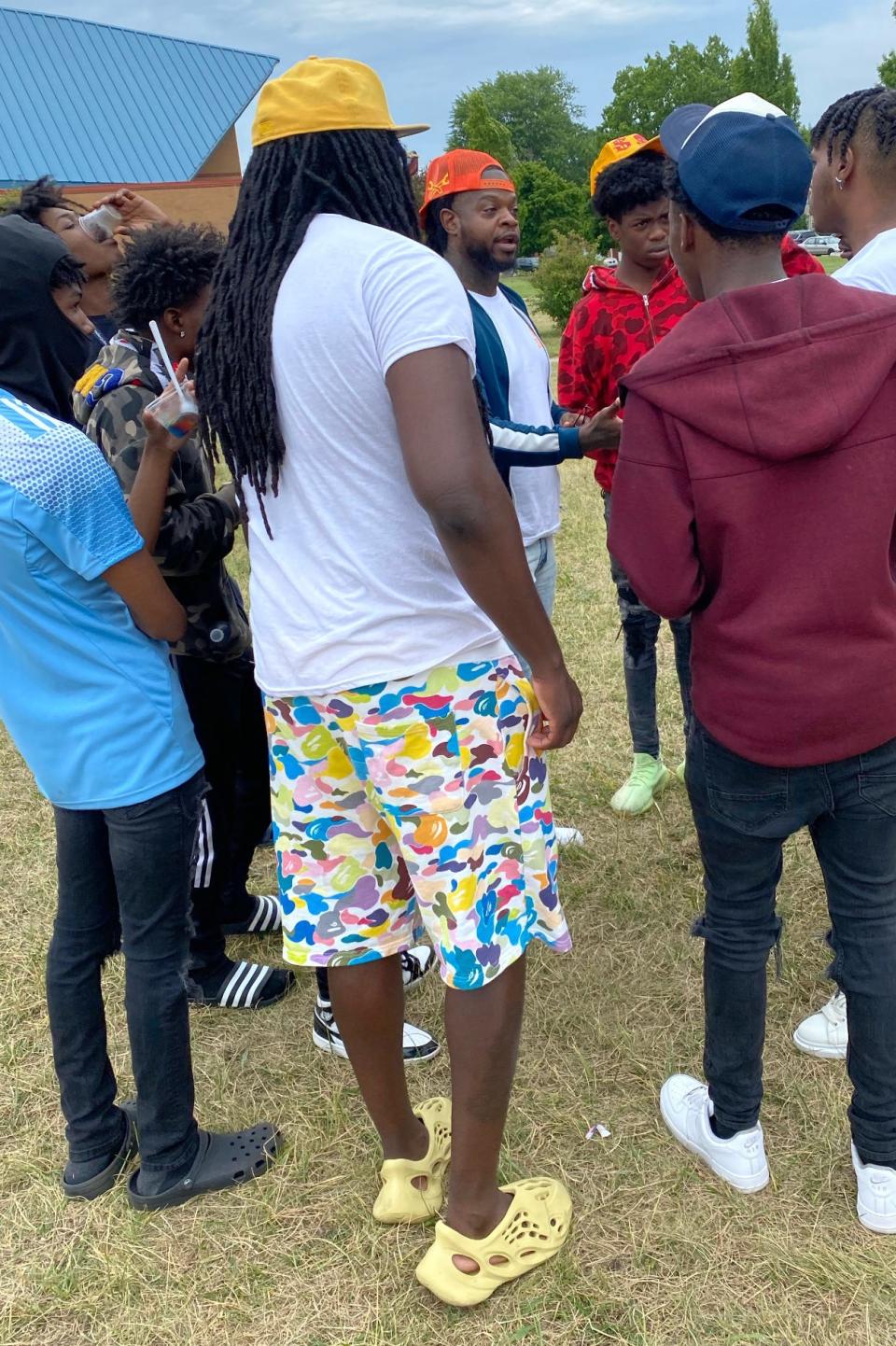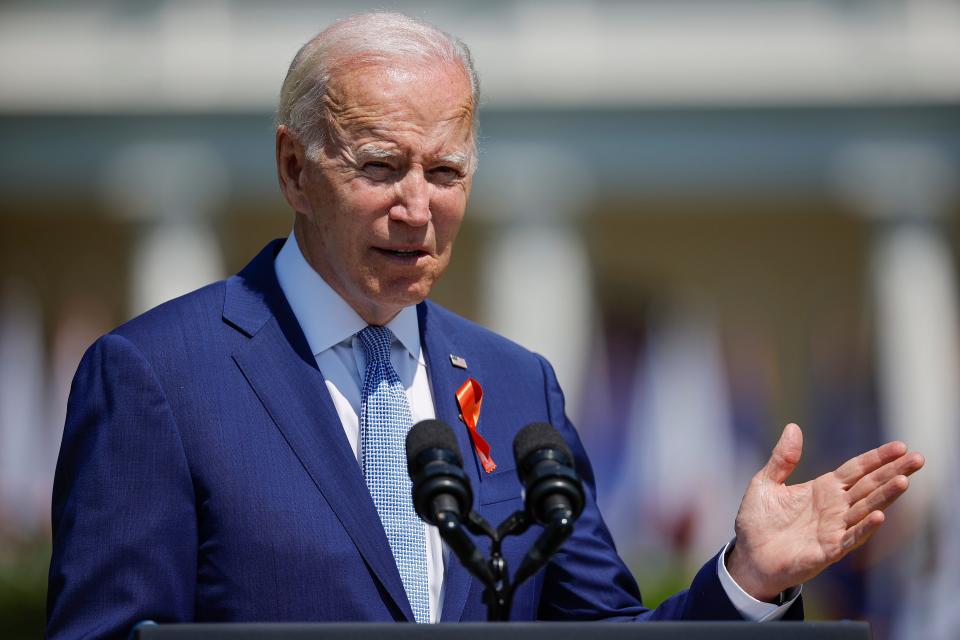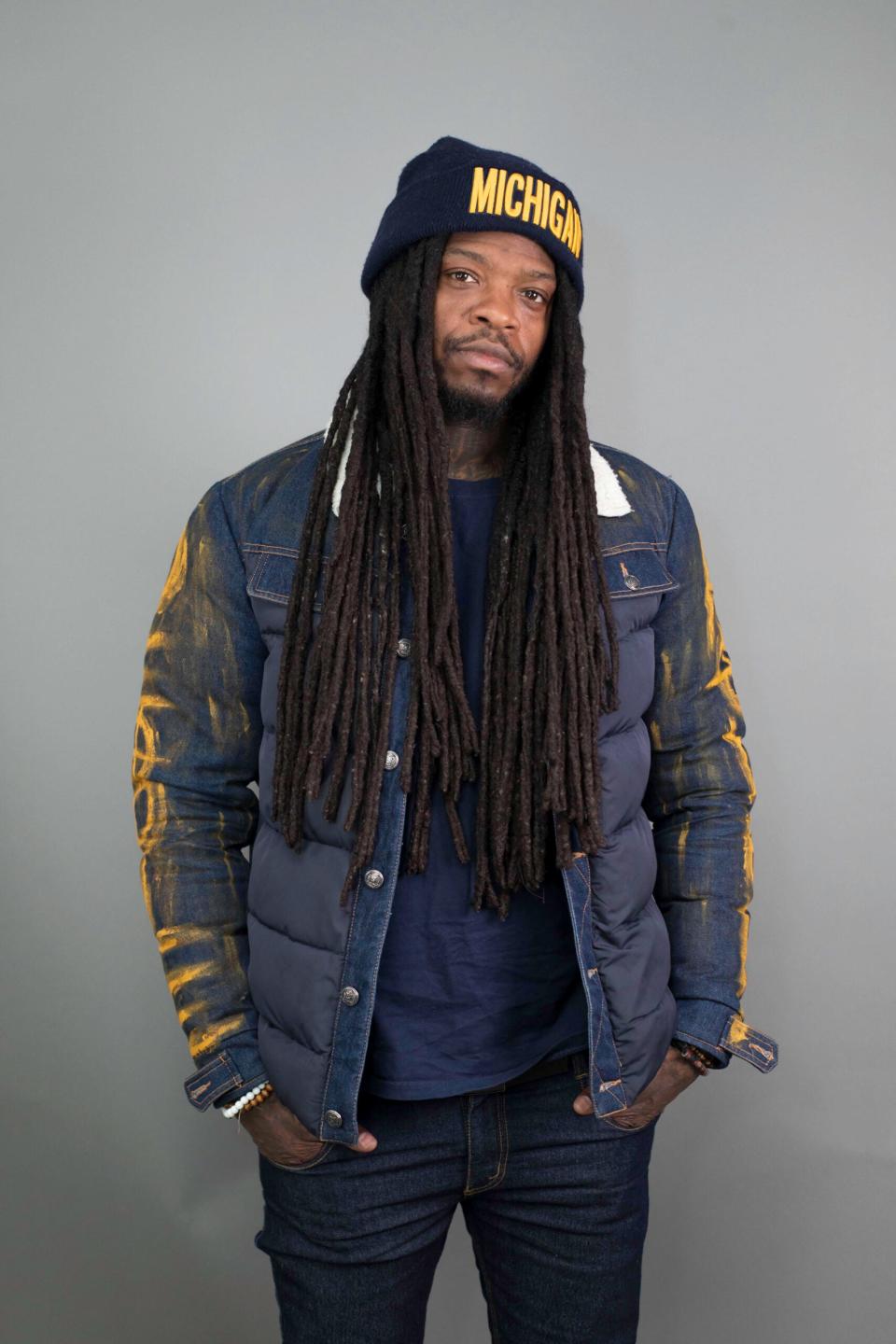Invited to the White House then shunned: 'No matter what they say, they don't see us'
- Oops!Something went wrong.Please try again later.
Dujuan "Zoe" Kennedy spends his days and nights mentoring young people in Detroit, particularly those most at risk of engaging in criminal behavior, gun violence and ultimately incarceration.
Kennedy, 41, understands the challenges more than most. He spent 14 years in prison for selling narcotics and manslaughter. While incarcerated, Kennedy linked with religious leaders, read and educated himself about the conditioning of criminals and worked to rehabilitate his life.
Three weeks after his release in 2019, he returned home and realized he had influence in his neighborhood. It became his life's mission to help those he believed were on a criminal path. He volunteered with FORCE (Faithfully Organizing Resources for Community Empowerment) Detroit as a community organizer and has never looked back.

It's no wonder then that when he was formally invited to a July White House summit on community violence intervention, he jumped at the chance to participate. He hopped on a plane, excited to interact with President Joe Biden and his intervention peers.
But when Kennedy arrived at the White House, he and four others were turned away at the gate. They were told they hadn't received U.S. Secret Service clearance. No further explanation was offered. As he watched hundreds of other participants file inside, he stood on the sidelines feeling dejected.
"When we walked out, we had a discussion outside the White House on the sidewalk about how you can be doing all of this stuff and they still don't want to recognize us – we just don't belong," Kennedy told me. "That was just confirmation that no matter what they say, they don't see us."
'Feels like I'm going to be punished for the rest of my life'
Around the country, city agencies, nonprofits and community organizations are partnering with police to address and prevent gun violence. Increasingly, former gang members and those formerly incarcerated – often referred to as violence interrupters, crisis responders or neighborhood change agents – have volunteered or been recruited to help deescalate potentially violent situations peacefully.
American cities are focusing on grassroots policing, prevention, outreach and mediation programs aimed at reducing gun violence. Often, these public-private collaborations, known generally as community violence intervention, employ trained professionals and community members to intervene and stop violent conflicts and provide wraparound services to those who have a high risk of violence.
Helping men at risk: How George Floyd's death inspired these former gang members to help the local neighborhood
Investing in evidence-based community violence interventions to reduce gun violence is a key pillar of Biden’s strategy to prevent and respond to gun crimes. The Bipartisan Safer Communities Act, which Biden signed into law in June, included $250 million for community violence intervention.

In July, Biden held a meeting of the White House Community Violence Intervention Collaborative to celebrate the bill's passage. Those invited included individuals who are part of the gun violence prevention community, including survivors, peacekeepers, organizers and practitioners. According to a White House release, the collaborative is "a 16-jurisdiction cohort of mayors, law enforcement, CVI experts, and philanthropic leaders committed to using American Rescue Plan funding or other public funding to increase investment in their community violence intervention infrastructure."
Kennedy fits the bill. But sadly, he and others weren't allowed inside because of their violent criminal histories.
Anthony Guglielmi, Secret Service spokesperson, told me the individuals "did not meet federal security entrance requirements mandated by the Secret Service."
"This was not a decision by White House staff," Guglielmi said. "This was exclusively a decision by the United States Secret Service."
Opinion alerts: Get columns from your favorite columnists + expert analysis on top issues, delivered straight to your device through the USA TODAY app. Don't have the app? Download it for free from your app store.
It's a slap in the face to those who have done their time and are now trying to give back to society. I've reported about these volunteers for years – I've accompanied them around city streets, watching as they put their personal lives, jobs and families on the backburner to help quell violence in their communities.
I'm an Alabama pastor. I watered my neighbor's flowers. What made me a suspect?
Tempted to push for tough-on-crime policies? You need to meet these 3 people.
These are committed individuals. I think because of their backgrounds, they work even harder to reclaim respect and to pay their hard-learned lessons forward to the next generation. I can only imagine the humiliation they felt. My heart breaks for them.
"It's the fact that they feel like we're responsible enough to put our lives at risk to stop another person from committing an act of violence, but they won't even let us come stand on the grass is disappointing," Kennedy told me. "There has to be systemic change to start to recognize people and allow them the opportunity to be fully redeemed. We are doing the work – don't discriminate against us. When you discriminate against people for a past, that's wrong. It just feels like I'm going to be punished for the rest of my life no matter what I do."
'We are disparaged'
He's not wrong.
For decades, ex-offenders in some states have been unfairly barred from voting, faced difficulty securing rental properties in which to live and are locked out of the job market. If we don't believe that prison can be a vehicle for rehabilitation for some, what even is the purpose?
Kennedy was so outraged by the snub that he wrote a letter to the president.
"We need real discussion about a system that fails to recognize the redemption of a human being, and refuses to honor the dangerous, but effective work – yet pretends to celebrate it. Instead, we are disparaged," Kennedy wrote.
He has received no response. Neither did I.
As the country continues to reimagine policing – and the crucial characters who aren't uniformed but are making a difference – it's prudent to ensure those with criminal records don't feel excluded or further stigmatized. After all, these are the folks, in addition to law enforcement officers, with boots on the ground trying to address violence in their communities.
I understand and respect the fact that the mission of the Secret Service is to protect the president. But if the White House is working with individuals who have been caught up in crime yet made it to the other side, I find it hard to believe they can't be flagged for special consideration. After all, everyone deserves a second chance.
'Very painful to see' them treated this way
Michael McBride, 46, lead pastor of The Way Christian Center in Berkeley, California, serves as executive director of the LIVE FREE USA Network, a social justice and gun violence prevention nonprofit. McBride, in his role as a violence prevention activist, works with the White House and Congress to secure federal funding for groups on the ground.

McBride said the White House invited his organization – and others from around the country – to submit the names of community organizers and survivors who would attend the summit. He never imagined that those helping address violence in their communities would be denied entry.
"As someone who works at the intersection of gun violence prevention, criminal justice reform and police violence, it's very painful to see that individuals who are working on this are being given a life sentence, it appears, as it relates to access to their own government, even though they've turned their life around.
"Once they serve their time, once they've gone through their process of rehabilitation and healing, they ought to be treated like everyone else," McBride told me. "And I think it's important to make sure that our systems bear that out."
More from Suzette Hackney:
Jimmy Kimmel's antics are just latest insult for Black women (and men) in Hollywood
What a gift – and a lot of pizzas – you have given someone who didn't want sympathy
We have a pandemic of poor policing practices on our hands, and lives are at risk
National columnist/deputy opinion editor Suzette Hackney is a member of USA TODAY’S Editorial Board. Contact her at shackney@usatoday.com or on Twitter: @suzyscribe
This column is part of a series by USA TODAY Opinion about police accountability and building safer communities. The project began in 2021 by examining qualified immunity and continues in 2022 by examining various ways to improve law enforcement. The project is made possible in part by a grant from Stand Together, which does not provide editorial input.
You can read diverse opinions from our Board of Contributors and other writers on the Opinion front page, on Twitter @usatodayopinion and in our daily Opinion newsletter. To respond to a column, submit a comment to letters@usatoday.com.
This article originally appeared on USA TODAY: Dear President Biden, you invited me to a violence intervention event

